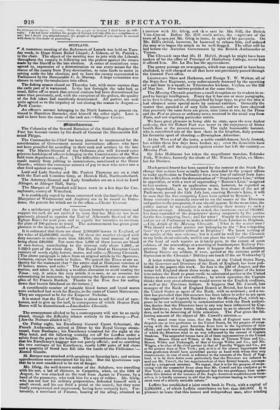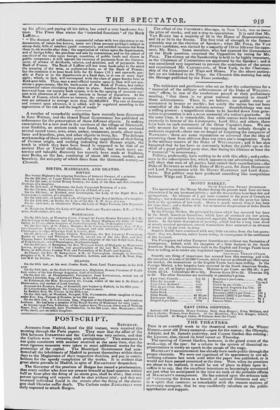Much astonishment has been caused by the rumour at the
Stock Ex- change that notices have actually been forwarded to the proper offices to make application to Parliament for a new line of railroad from Lon. don to Brighton, under the denomination of " Stephenson's Line," either in opposition, or with a view of superseding " Rennie's Line," as agreed to last session. Such an application must, however, be regarded as utterly improbable, as, by reference to the first clause of the act of Parliament, passed the 15th July last, enacting Rennie's Line, it will be seen that the five competing Lines have agreed to Bernie's. • * Some curiosity is naturally evinced to see the names of the Directors and parties to the prospectus, if one should appear. In the mean time, the public cannot lie too cautious in subscribing their money to such a hopeless attempt. Already, it is stated, the enormous sum of 180,0001. hes been expended of the proprietors' money conjointly by the parties for the five competing lines ; and for what ? Simply to obtain surveys and an act of Parliament to make a railroad from London to Brighton. —City Article if the Atoning Chroacle. [What is the matter now? Why should not other parties not belonging to the " five competing lines" try to get another railroad to Brighton ? We know nothing of the merits of this new scheme ; but it would be well for the Chronicle to say little about railroads, until it can place the word "advertisement" at the head of such reports as it lately gave, to the extent of seven columns, of the proceedings at a meeting of Southampton Railway Pro- prietors. By the way, how does it happen that the Southampton Railway Shares are seldom, if ever, quoted at the extreme point of depression in the Chronicle? Did they not touch 17 dia. on Wednesday?] A letter written by Captain Stockton, of the United States Navy, to the Governor and Directors of the Bank of England, has been pub- lished in the papers this week. Its date is the 23d of August, and the writer left England about three weeks ago. The object of the letter is to induce the Bunk to grant credit to substantial parties in the United States to the extent of two millions ; by which operation the Captain thinks that very great advantage would accrue to the English creditors, as well as the American debtors. It happens that Mr. Cowell, late manager of the Bank of England Branch at Bristol, has been sent to the United States as agent of the Bank, with an assistant ; and a no- tion has prevailed that this measure has been taken in order to act upon the suggestions of Captain Stockton ; but the Morning Post, which ap- pears to be not unfrequently in communication with the Bank authori- ties, denies that the Directors have in any way been influenced by Cap- tain Stockton; whose letter, indeed, appears to us to abound in blun- ders, and to be deserving of little attention. The Post gives the fol- lowing account of the object of Mr. Cowell's mission.— " We stated some time since, that the Bank of England were about to despatch one or two gentlemen to the United States, for the purpose of coope- rating with the three great American firms here in the liquidation of their affairs; and such was simply the truth, but this 'WAS a measure in the adoption of which the Directors were in no way influenced by the counsel of Captain Stockton. The suspended houses have all of theta representatives in the United States. Messrs. Shaw and Wilson, of the firm of Thomas Wilson and Co., Messrs. Wildes and Pickenigill, of that of George Wades and Co., and Mr. Wiggin, a bruther of the chief partner in that of Timothy Wiggin and Co., are at the present time at New York ; and, as it is of the utmost importance that
these gentlemen should have accredited parties at hand with whom they may
communicate, in case of need, in reference to the interests of the Bank of Eng- land, it is by their desire more particularly that the Directors are induced to send out Mr. Cowell, the late superintendent of their Bristol branch, accompa- nied by a competent assistant. We repeat, that it is for the purpose of coOpe- ratiog with the suspended firms alone that Mr. Cowell and his coadjutor go to New York ; and, having already explained that the two gentlemen have under- taken this mission at the instance of the Anglo.American emablishments them- selves, it is hardly necessary to add that the negotiations heading to the arrange. meat were of a strictly amicable nature."
Laffitte has established a joint stock bank in Pesis, with a capital of 2,200,0001. ; of which Laffitte contributes no leas, than 300,0001. It is pleasant to learn that this honest and independent assn, atter winding • up his affairs and paying all his debts, has saved a very handsome for- tune. The Times thus states the "intended functions" of the Bank Laffitte- 44 The discount of well-known commercial values with two signatures or en- dorsements, of values less known, notes not (from amount perhaps) subject to stamp-duty, bills ot retailers (petit commerce), and certified invoices due from -three to six months after date; the negotiation of values upon the departments, and of foreign bills; the purchase and sale by commission, and to the extent of one-third of the value upon foreign countries, of public funds and shares in public companies; it will operate the recovery of payments from the Govern- ment, of arrears of dividends, salaries, and pensions, and of payments from Bank of France. The Bank Of Laffitte will not issue bank-notes in the strict the meaning of the term, as understood here, or of the Bank of France; but the intention is to issue bank .bills for 25 fiance (1/. ) and upwards, pay- able at Paris or in the departments at a fixed date, or at one or more days' sight ; which, in fact, will correspond with the class of paper known here as Bank-post-bills. Thus, says a semi-official treatise upon it, they will not con- stitute a paper-money, like the bank-notes of the Bank of France, but rather commercial values circulating from place to place. Another feature, evidently borrowed from our country bank system, is to be the opening of accounts cur- rent with allowance of 3 per cent. interest in favour of depositors. At the Bank of France, which allows no interest, the credits of these accounts cur- rent are estimated to average more than 50,000,000 f. The rate ot discount and interest upon advances, it is added, will be regulated according to the appreciation of the risk and the length of credit."



























 Previous page
Previous page